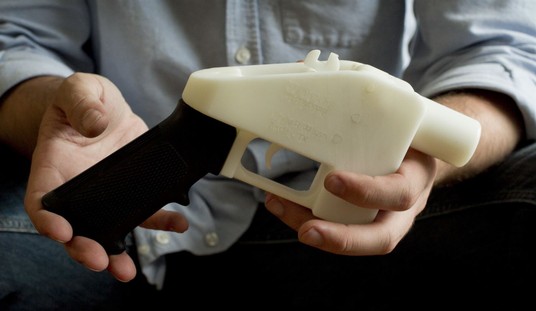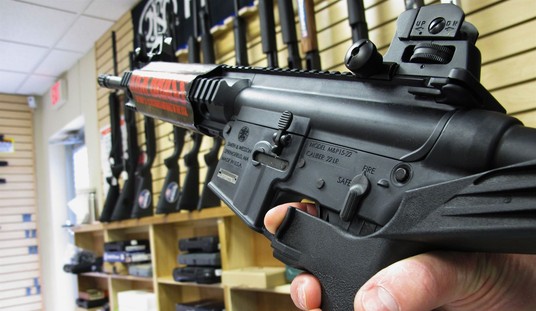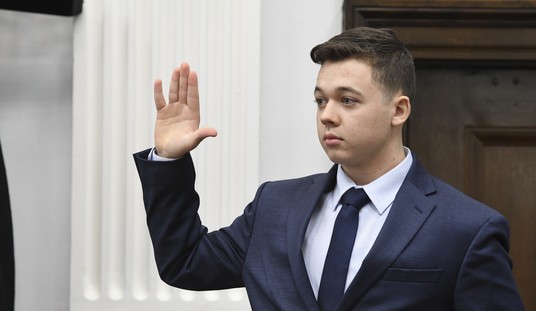President Trump has hit the pause button on his tariff threat to Mexico after discussions with his counterpart south of the border, but President Claudia Sheinbaum says that while her country will increase the number of military troops at the border to counter the drug cartels' trafficking of fentanyl, Trump has agreed to "work jointly to avoid the entry of guns to Mexico."
Sheinbaum's comments came during her press conference on Monday. The Wall St. Journal covered Sheinbaum's remarks, but she apparently didn't announce any details of the supposed agreement between Trump and herself.
"There are rocket launchers that come from the U.S. illegally,” Sheinbaum said she told Trump. “How is that possible?”
Mexico says that upwards of 70% of the weapons used by the country’s organized crime groups are smuggled from the U.S. “For the first time, the U.S. government will work jointly to avoid the entry of guns to Mexico,” she said at her daily news conference on Monday. Mexico is suing U.S. gun manufacturers and arms dealers in federal courts to try to end the illegal trafficking of weapons to the country.
If Sheinbaum's end of the deal involves sending 10,000 troops to the U.S.-Mexico border to combat fentanyl trafficking, what is Trump supposed to do in return? Increasing border patrols is one thing, but Sheinbaum's interest in targeting gun dealers and manufacturers suggests she might have something else in mind.
Sheinbaum also hit back after Washington accused her government of having an "intolerable alliance" with drug trafficking groups.
"We categorically reject the slander made by the White House against the Mexican government about alliances with criminal organizations," Sheinbaum wrote earlier on social media.
"If there is such an alliance anywhere, it is in the U.S. gun shops that sell high-powered weapons to these criminal groups," she added.
U.S. gun stores aren't selling rocket launchers to cartel members, despite Sheinbaum's claims. In fact, one of the major sources of U.S.-manufactured arms that end up in the hands of the cartels were diverted there by Mexican law enforcement and the military. As CBS News reported more than a decade ago:
The State Department audits only a tiny sample - less than 1 percent of sales - but the results are disturbing: In 2009, more than a quarter (26 percent) of the guns sold to the region that includes Mexico were "diverted" into the wrong hands, or had other "unfavorable" results.
The National Shooting Sports Foundation's Larry Keane, who speaks for gun manufacturers, said he understands the potential for abuse.
"There have been 150,000 or more Mexican soldiers defect to go work for the cartels, and I think it's safe to assume that when they defect they take their firearms with them," Keane told CBS News.
If Sheinbaum really wanted to curtail cartel access to U.S. firearms she could order a halt to the direct sales to Mexican law enforcement and the military, but that would mean pointing the finger at the corruption within her own government instead of scapegoating the U.S. firearms industry.
I don't think Trump is interested in stopping those sales either, to be honest, but the question still remains: what "help" did Trump offer, exactly?
Gun control groups like Brady are calling on Trump to "craft a plan to ensure that gun manufacturers do not do business with those who break the law, fund the ATF, and instead of diverting agents to focus on immigration enforcement, allow them to focus on holding rogue gun dealers accountable."
Trump has yet to do undo the ATF rules enacted under the Biden administration, which has already exasperated many Second Amendment advocates. Now he also needs to offer up specifics about his agreement with Sheinbaum to put gun owners at ease. Combatting the cartels shouldn't result in an emboldened ATF or actions against the firearms industry, but that's exactly what Sheinbaum and her allies in the American gun control movement are demanding.









